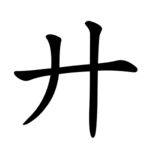Radical 55
 From Wikipedia the free encyclopedia
From Wikipedia the free encyclopedia
| 廾 | ||
|---|---|---|
| ||
| 廾 (U+5EFE) "two hands, arch" | ||
| Pronunciations | ||
| Pinyin: | gǒng | |
| Bopomofo: | ㄍㄨㄥˇ | |
| Wade–Giles: | kung3 | |
| Cantonese Yale: | gúng | |
| Jyutping: | gung2 | |
| Pe̍h-ōe-jī: | kióng | |
| Japanese Kana: | キョウ kyō (on'yomi) | |
| Sino-Korean: | 공 gong | |
| Names | ||
| Chinese name(s): | 弄字底 nòngzìdǐ | |
| Japanese name(s): | 拱き/こまぬき komanuki 廿脚/にじゅうあし nijūashi | |
| Hangul: | 들 teul | |
| Stroke order animation | ||
 | ||
Radical 55 or radical two hands (廾部) meaning "two hands", "twenty" or "arch" is one of the 31 Kangxi radicals (214 radicals in total) composed of three strokes.
In the Kangxi Dictionary, there are 50 characters (out of 49,030) to be found under this radical.
廾 is also the 32nd indexing component in the Table of Indexing Chinese Character Components predominantly adopted by Simplified Chinese dictionaries published in mainland China.
Evolution
[edit]- Oracle bone script character
- Bronze script character
- Large seal script character
- Small seal script character
Derived characters
[edit]| Strokes | Characters |
|---|---|
| +0 | 廾 |
| +1 | 廿 开SC (=開 -> 門) |
| +2 | 弁 (also JP form of 辨 -> 辛 / 瓣 -> 瓜 / 辯 -> 辛) |
| +3 | 异SC/variant (=異 -> 田) |
| +4 | 弃SC/variant (=棄 -> 木) 弄 弅 |
| +5 | 弆 |
| +6 | 弇 弈 |
| +7 | 弉 |
| +12 | 弊 |
Literature
[edit]- Fazzioli, Edoardo (1987). Chinese calligraphy : from pictograph to ideogram : the history of 214 essential Chinese/Japanese characters. calligraphy by Rebecca Hon Ko. New York: Abbeville Press. ISBN 0-89659-774-1.
- Lunde, Ken (Jan 5, 2009). "Appendix J: Japanese Character Sets" (PDF). CJKV Information Processing: Chinese, Japanese, Korean & Vietnamese Computing (Second ed.). Sebastopol, Calif.: O'Reilly Media. ISBN 978-0-596-51447-1.



